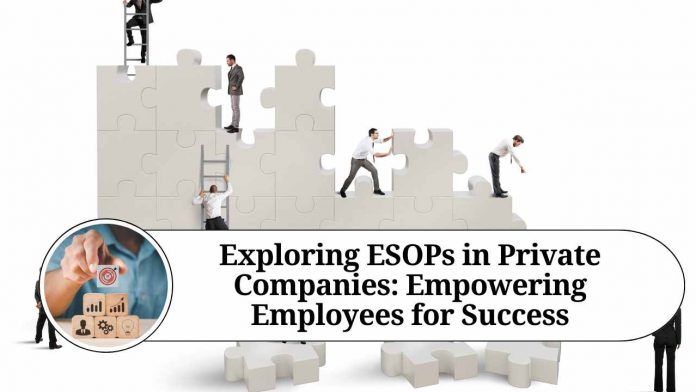Introduction
In today’s competitive business landscape, attracting and retaining talented employees is crucial for the success of any company. One innovative approach that has gained significant popularity in recent years is the implementation of Employee Stock Ownership Plans (ESOPs). While ESOPs were traditionally associated with publicly traded companies, they have now become a valuable tool for private companies as well. In this blog post, we will delve into the world of ESOPs in private companies, exploring their benefits, challenges, and potential impact on employee engagement and company growth.
- Understanding ESOPs: ESOPs are a form of employee benefit plan that provides employees with an ownership stake in the company. The company sets up a trust fund and contributes shares of its stock or cash to the fund. These shares are then allocated to employees based on various criteria, such as their tenure, performance, or a combination of both. ESOPs can be an effective way to align the interests of employees with those of the company, fostering a sense of ownership, commitment, and motivation among the workforce.
- Benefits of ESOPs in Private Companies: 2.1. Employee Engagement: By offering employees a stake in the company’s success, ESOPs can significantly enhance employee engagement and loyalty. When employees have a financial interest in the company’s performance, they are more likely to go the extra mile, contributing their best efforts towards achieving the company’s goals.
2.2. Retention and Recruitment: ESOPs can be a powerful tool for attracting and retaining top talent. The opportunity to become a shareholder in the company can be an attractive incentive for prospective employees. Additionally, existing employees are more likely to stay with the company, knowing that their dedication and hard work will be rewarded through the appreciation of their stock holdings.
2.3. Wealth Creation for Employees: As the company grows and becomes more successful, the value of the ESOP shares also increases. This provides employees with a unique opportunity to accumulate wealth over time. ESOPs can play a vital role in promoting income equality and narrowing the wealth gap by allowing employees to benefit directly from the company’s financial prosperity.
- Challenges and Considerations: 3.1. Valuation and Liquidity: Determining the value of a private company’s shares can be complex. Moreover, providing employees with an opportunity to convert their ESOP holdings into cash can pose liquidity challenges. Proper planning, regular valuations, and implementing appropriate mechanisms for share sales or buybacks are essential to address these challenges effectively.
3.2. Communication and Education: To ensure the success of an ESOP, clear communication and comprehensive education programs are crucial. Employees need to understand the mechanics of the plan, the potential risks and rewards, and the long-term implications of owning company stock. Regular updates and educational sessions can help foster a culture of transparency and empower employees to make informed decisions.
3.3. Compliance and Regulatory Requirements: ESOPs are subject to various legal and regulatory requirements that must be carefully navigated. Private companies need to seek expert guidance to ensure compliance with applicable laws, including the Employee Retirement Income Security Act (ERISA) in the United States.
- Impact on Company Growth: Implementing an ESOP in a private company can have a positive impact on its growth trajectory. When employees have a vested interest in the company’s success, they are more motivated to innovate, take ownership of their work, and contribute to the overall growth and profitability of the organization. This can lead to increased productivity, improved employee morale, and a stronger competitive advantage.
Conclusion
ESOPs have emerged as a powerful tool for private companies to attract, motivate, and retain talented employees. By providing employees with a stake in the company’s success
Other Related Blogs: Section 144B Income Tax Act
Frequently Asked Questions (FAQs)
Q. What is an ESOP?
An Employee Stock Ownership Plan (ESOP) is a type of employee benefit plan that allows employees to own a portion of the company they work for. It is a mechanism through which employees receive shares of company stock or cash contributions in a trust fund.
Q. Are ESOPs only for publicly traded companies?
No, ESOPs can be implemented by both publicly traded and private companies. While they were traditionally associated with public companies, private companies have increasingly embraced ESOPs as a way to engage and incentivize their employees.
Q. How do ESOPs benefit employees?
ESOPs offer several benefits to employees. They provide a sense of ownership, aligning employees’ interests with the company’s success. Employees have the opportunity to accumulate wealth through the appreciation of their ESOP shares. ESOPs can also enhance employee engagement, loyalty, and job satisfaction.
Q. How are ESOP shares allocated to employees?
The allocation of ESOP shares can vary depending on the company’s policies. Common allocation methods include based on an employee’s tenure, performance, or a combination of both. The specific criteria are determined by the company and outlined in the ESOP plan.
Q. Can employees sell their ESOP shares?
In private companies, the ability for employees to sell their ESOP shares depends on the company’s policies and the availability of a market for the shares. Liquidity can be a challenge for ESOP shares in private companies, and mechanisms such as share sales or buybacks may be implemented to provide employees with an opportunity to sell their shares.
Q. What happens to ESOP shares if an employee leaves the company?
If an employee leaves the company, the treatment of their ESOP shares will depend on the ESOP plan and applicable regulations. In some cases, employees may have the option to sell their shares back to the company or transfer them to other eligible employees. Vesting schedules may also determine the portion of shares an employee is entitled to upon leaving.
Q. Are ESOPs regulated?
Yes, ESOPs are subject to regulatory requirements, particularly in the United States, where the Employee Retirement Income Security Act (ERISA) governs certain aspects of ESOPs. It is important for companies to comply with applicable laws and seek expert guidance to ensure legal and regulatory compliance.
Q. Can ESOPs be used for succession planning in private companies?
Yes, ESOPs can be a valuable tool for succession planning in private companies. They provide a mechanism for business owners to sell their shares to the ESOP trust fund, allowing for a smooth transition of ownership and providing employees with an opportunity to become owners of the company.
Q. Are ESOPs suitable for all private companies?
ESOPs may not be suitable for all private companies. Implementing an ESOP requires careful consideration of various factors, including company size, financial stability, and long-term goals. It is recommended to consult with professionals specializing in ESOPs and conduct a thorough analysis before deciding to implement an ESOP.
Q. How can companies communicate the benefits of an ESOP to employees?
Clear and effective communication is key to the success of an ESOP. Companies can hold informational sessions, provide educational materials, and offer one-on-one consultations to ensure that employees understand the mechanics of the plan, the potential benefits, and any risks associated with owning company stock.




















